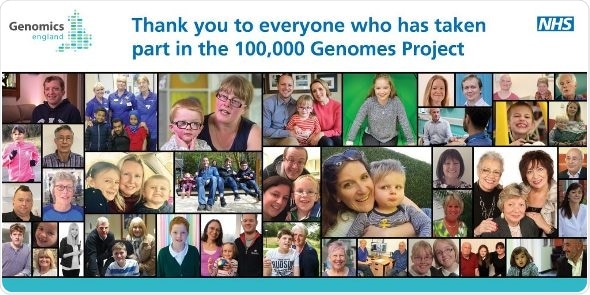
Groundbreaking 100,000 Genomes Project achieves important milestone to transform NHS care
The Department of Health and Social Care, NHS England and Genomics England today announced reaching the 50,000 whole human genome sequences landmark within the 100,000 Genomes Project.

It is a milestone that sets the UK on track to fully realize the potential of genomic medicine, deliver better care for patients and establish the UK as the global ‘go to’ destination in the fast emerging genomics sector.
Genomics England was established in 2013 as a wholly owned company of the Department of Health and Social Care by the Secretary of State, Jeremy Hunt. It is tasked with the delivery of the groundbreaking 100,000 Genomes Project, which is sequencing 100,000 genomes from 70,000 people, focused on patients with rare diseases, their families, and patients with cancer.
In stimulating genomic research and discovery, Genomics England aims to improve patient care and establish the UK as the center of the global genomics industry.
Achieving the 50,000 genomes landmark has only been made possible through the generous participation of tens of thousands of patients and their families – taking part in a Project at the edge of known science. Staff in NHS Genomic Medicine Centres (GMCs), as well as those in Northern Ireland, Scotland and Wales, have worked tirelessly to not only deliver the Project, but in many cases, also pioneered totally new systems, processes and procedures to ensure that genomic medicine can become part of routine NHS care.
The project is already changing the lives of patients with a rare disease – often providing diagnoses for the first time after years of uncertainty and distress (known as the diagnostic odyssey), as well as working towards reducing costs to health and social care budgets. In cancer, significant progress has been made in tackling the global challenge of extracting of DNA of sufficient quality for whole genome sequencing – leading to significant redesign of tissue handling in the NHS.
The scope and scale of the 100,000 Genomes Project, unparalleled anywhere else in the world, has been made possible through the UK’s unique asset − its National Health Service. The NHS, as the single biggest integrated healthcare system in the world, is able to link lifelong healthcare information with whole genome sequencing data. It is a combination that brings benefit to patients whilst also demonstrating the UK’s competitive advantage in enhancing understanding of diseases, and developing products for earlier detection and treatment.
Health Secretary Jeremy Hunt said:
Genomics England Executive Chair, Sir John Chisholm, said:
Professor Sue Hill OBE, Chief Scientific Officer for England and Senior Responsible Officer for Genomics at NHS England, said:
Francis deSouza, President and CEO of lllumina (the 100,000 Genomes Project’s sequencing partner), said:





















.png)












No hay comentarios:
Publicar un comentario